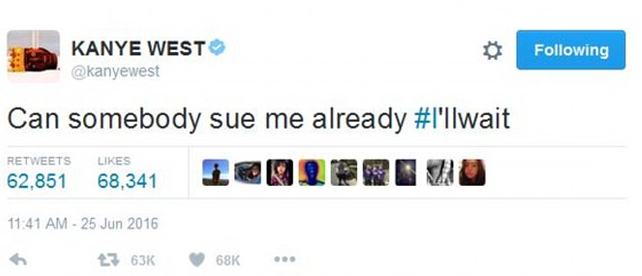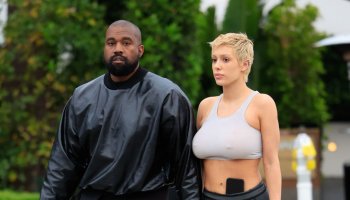It’s all fun and games until the lawyers get involved. If Taylor Swfit chooses to take legal action against Kanye West and Kim Kardashian for recording and posting their conversation, West could do some jail time.
According to The Hollywood Reporter, West could face up to a year behind bars if Swift ever decided to play the ultimate victim role and take him and his wife to court for recording their talk about his line about her on his song “Famous.”
In case you’ve been missing out on the fun, on the song West claimed that he could still have sex with Swift because he “made that b*tch famous.” Of course that line raised eyebrows, but West insisted that he talked to Swift and that she said she was cool with it. Swift denied that ever happened, and then Kardashian released a video this week proving that the talk did indeed happen. Swift’s social media timeline has been in shambles ever since.
So fast forward to now, West may have broken a law by recording the conversation in the first place.
Per THR:
West probably didn’t need consent for mentioning Swift (or calling her a “bitch”) in his song, as best illustrated by a 2013 court ruling favoring Pitbull against Lindsay Lohan. The First Amendment protects such expression. Nevertheless, West spoke to Swift before “Famous” came out to run at least some of his lyrics by her. In doing so, he may have made a move that possibly did require consent: He recorded the conversation…This situation raises several potential legal issues. And unfortunately, many of them are dependent on facts that aren’t known for sure (or that are disputed). For instance, where was West during this phone call? Where was Swift? The answers could have implications for the legality of West’s actions.
The issue of location probably would be the first one addressed in any legal case over a surreptitiously recorded phone conversation. Although federal law permits such recording whenever at least one party consents, 11 states require “two-party consent,” meaning both sides of a phone conversation must OK the recording. That includes California, where penalties for violations include up to a year in prison.
If Swift and West both participated in the call in California, that’s the worst case scenario for West. But even if only West was in California and Swift was elsewhere, that’s still bad for him because the state, unlike some others where “two-party consent” is required, doesn’t provide him any breaks if Swift herself wasn’t in the state during the time of the phone call, according to legal experts consulted by The Hollywood Reporter.
But the analysis doesn’t end there.
First of all, “two-party consent” has taken some judicial heat in recent years. For example, in Illinois (West’s home state), the state’s Supreme Court ruled in 2014 that a provision against recording conversations was unconstitutional as an impingement of the First Amendment. California’s own law also could undergo such an examination in the future.
Here’s to hoping West didn’t record the phone call in California. West pushed another line when he put wax figurines of Swift and other celebrities in the music video for “Famous.” He even dared one of them to sue him. If Swift does decide to do that and use the “two-party consent” rule in doing so, he might wish that he hadn’t asked for that.
















